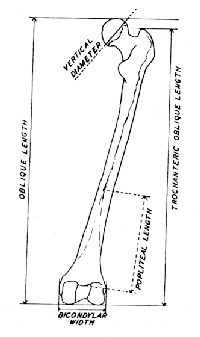
 |
ANT 211
Fundamentals of Forensic Anthropology
Defining Forensic Anthropology
(page 5 of 5)
III. How does forensic anthropology differ from forensic pathology?
A. Forensic anthropologists are experienced osteologists. Forensic anthropologists usually hold a doctorate degree (Ph.D.), but many have a master's degree (MA) in anthropology; and only in rare cases do some hold a bachelor's degree (BA) in anthropology (the BA's typically have years of experience and extensive training, nonetheless).
To become a forensic anthropologist, one first studies all the subfields of anthropology, since there is a large degree of overlap. For example, excavation techniques in archaeology are essential for proper recovery of buried human remains, and understanding the cultural context of a site is imperative since a found body could very well be of ancient humans and not a modern human at all.
After the initial study of all subfields, a focus on physical anthropology and all of its subdisciplines follows. Osteology is emphasized. From there, the specialization in the forensic application of osteology can be developed.

Forensic anthropologists with advanced (graduate) degrees usually (but not always) work in an academic setting--at a college or university. This employment setting involves teaching courses, conducting research, and providing service, such as forensic consultation services.
Other employment settings for forensic anthropologists include government positions, such as at the Central Identification Laboratory in Hawaii (CILHI--pronounced "seal-hi") where numerous MIA's (soldiers Missing In Action) are being analyzed to establish identity), laboratories like the FBI (Federal Bureau of Investigation) and state bureaus of investigation or private firms, and medical examiner/coroner facilities nationwide and worldwide.
B. Forensic pathologists are medical doctors, physicians, with a specialization in forensic pathology. Forensic pathologists perform autopsies (examinations of people who have died) in the endeavor to establish cause of death. Causes of death may be classified in different ways such as natural, accidental, suicidal, homicidal, due to disease, etc.

Whereas the forensic anthropologist's general focus is on bones (hard tissue), the forensic pathologist's general focus is on soft tissue (i.e. organs and body fluids).
![]()
Forensic pathologists hold a doctor of medicine degree (MD), which requires a bachelor's degree with "pre-med" courses, four years of medical school, followed by a residency in pathology, then further training in forensic pathology. Not all doctors who perfomr autopsies are forensic pathologists; however, in complex cases, forensic pathologists are usually consulted.
The End